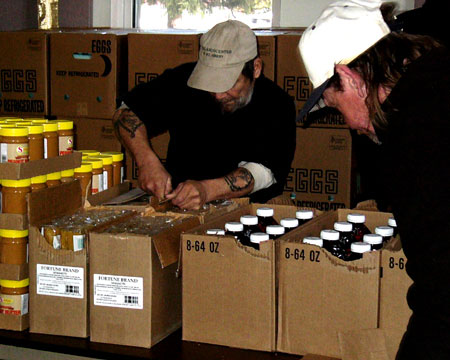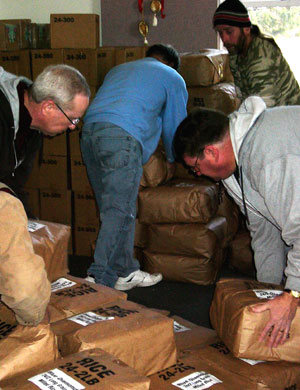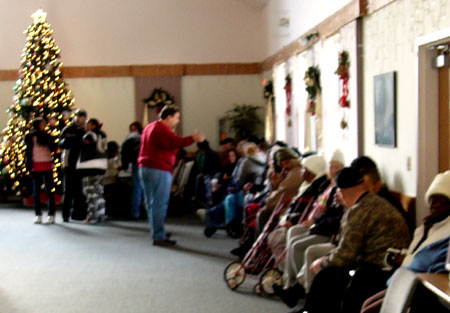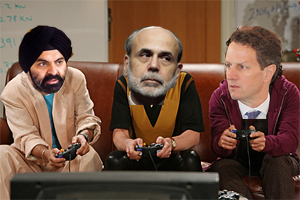The Hunger Game
 Thursday, December 23, 2010 at 9:26AM
Thursday, December 23, 2010 at 9:26AM The good news is there’s no reason anyone should ever starve to death in America. The bad news is more and more working Americans, many earning what were once middle class incomes, are spending their time and scarce money to find their next meal.
Think it can’t happen to you? The necessity of food will be the last thing you’ll spend your limited funds on as wage stagnation, the cost of energy, housing and other mandatory expenses drive middle class family budgets to the breaking point.

Emergency Food: More and More, It’s What’s for Dinner
The good news is there's no reason anyone should ever starve to death in America. The bad news is more and more working Americans, many earning what were once middle class incomes, are spending their time and scarce money to find their next meal.
Think it can't happen to you? The necessity of food will be the last thing you'll spend your limited funds on as wage stagnation, the cost of energy, housing and other mandatory expenses drive middle class family budgets to the breaking point.
Val Traore, the radiant and gregarious CEO of the Food Bank of South Jersey (FBSJ), wanted to make one thing perfectly clear in our discussion of hunger in America today. "We do not have starvation here in the United States. In Mali," she says, referring to the West African country where about half the population lives below the international poverty line of $1.25 a day, "if you live in poverty you risk starvation and death. That doesn't happen here in America." It's an important point worth dwelling on.
So what is happening here?
"We're seeing a large number of families that have never needed food assistance before," reports Traore. How many? So far, for 2010 FBSJ has witnessed a 10% increase in their client base of approximately 100,000 people. Here's the surprise: a large portion of the people needing food assistance today are working, and especially among FBSJ's new clients, many are earning incomes nearly twice the poverty line of $22,055 per year for a family of four (up to 185% of poverty).
Who are the hungry and why can't they afford to feed themselves and their families? Increasingly, the shocking answer is this: If you are not financially independent, the odds are good that someday you could be waiting in line to feed yourself and your family.
Food Lines: The Growing Reality Based Social Network
December 18, 2010 - Burlington County, NJ: Especially since the airing of television shows like "The Sopranos" and "Jersey Shore" most of the nation probably sees New Jersey as some cultural aberration. Perhaps it is. But, this is south Jersey and the landscape looks a lot like other semi-rural areas of the country.
On the drive from Philadelphia through Burlington County, a main highway cuts through farmland that includes several agricultural supply and farm equipment dealers. There are also strip malls, fast food franchises and diners offering breakfast for $2.99 and prime rib dinner specials as low as $10.99. If you were somehow transported here and I told you that you were in Ohio, you would have no reason not to believe me.
In Browns Mills, population 11,257, a tractor trailer painted as the "Hope Mobile" carrying about 28,000 pounds of food is being unloaded at the local United Methodist Church. People are lined up outside, but most of the line has been moved inside on this frigid morning. The church pastor has allowed the use of the facility's assembly room and adjacent corridor to bring members of some 600 pre-qualified, pre-registered families in from the cold.

Depression soup lines have nothing on this sucker. The first in line sit along the hundred foot length of the assembly room where a beautifully lighted Christmas tree glows. The line extends out the door and down one side of a hundred foot corridor and then loops back on itself down the opposite wall. At the end of the line, another 30 feet or so, people will brave the weather for an hour or two until things get moving. Over 20,000 pounds of food will be provided to the crowd here, the remaining 7,000 pounds will go to a second event later in the day in Camden, NJ.
The Browns Mills' Hope Mobile drop has been occurring monthly since August in an effort to relieve demand on overwhelmed local pantries. Some 450,000 people live here in Burlington County where the median household income here is just under $77,000 per year. The county is 77% white, 17% black and 6% Hispanic.
Many of the people here (according to national averages about 70%) are just plain poor. Some are on Social Security Disability. Others are senior citizens living on small fixed incomes. Some of them care for grandchildren that their own children, for whatever reason, can not care for.
A few are homeless, or the formerly homeless who have recently found a place live. They are white, they are black and they are Hispanic. All represented in good numbers. They are a typical gathering of Americans in winter wear, with kids in tow and babies in strollers. If I put them all in a local shopping mall - even the ones that told me they were homeless - you would have no reason to believe they weren't holiday shopping.
Deborah (all the names of those interviewed for this article have been changed) is twenty-something, smart, articulate, bi-lingual single mother of four. After losing a well paying job eight months ago, she took a warehouse position at minimum wage, $7.25 an hour in New Jersey, and moved her family into a shelter.
She's hoping her education and language skills will mean a quick promotion and higher wages. Though she pays little in rent, she tells me that after her car expense, diapers and clothes, there's no much left for food. A quick calculation reveals her car expenses alone will eat up nearly a third of her $14,790 annual income.
If you can't quite relate to a single mother of four, who recently lost a significant amount of income, then consider Joan.
Joan tells me over and over that hers is a good story that people need to hear. Unfortunately, for her and her family she is right.
Before moving to Shamong, NJ, Joan, her husband and four children, lived a well above average middle class life in a suburban Toledo, OH. They owned a single family home. She ran a home day care to supplement her husband's $80,000 plus income. He worked as a pipeline technician, a career he built over 26 years, lost 14 months ago and has not been able to reclaim. Two years ago he found work in New Jersey through relatives and the family moved.
Moving meant Joan's day care income was gone. It also meant a cut in her husband's salary to $40,000, and an increase in rent from $875 monthly mortgage payment, which included principle, interest, taxes and insurance, to a trailer park rent of $1,125.
Doing some quick math for Joan's situation reveals how the Great Recession has decimated middle class America: after taxes $40,000 is about $30,000 take home in New Jersey. Less $5,000 for carfare to get to work. Less $13,500 for rent. Utilities and phone, let's say $2,400; way too low, right? That leaves $14,100 for food, insurance, diapers, laundry, clothes and every other vagary life throws at a family of six. Since a decent family health care insurance is at least $9,000 per year, I'll bet they aren't making what's left of the COBRA payments.
Think you can feed yourself for $5 a day? What would you buy? What would you forego? Fast food will eat up that whole amount in a single meal. If Joan spends every cent of her family's $14,100 of "discretionary" money on food she would have a $6.53 per person per day food budget.
Joan wasn't embarrassed to talk about her situation with me. For whatever reason, she wanted people to know her story. But she was the exception. There were many others seeking a week's worth of food who didn't want to be noticed. They were still well shod. One middle aged gentleman, escorting his wife, was twitching. He didn't care to share his story.
Why You Will Choose to Be Hungry
Setting priorities when your budget gets squeezed is exactly why food is going to come last and why you're going to be left with little or nothing to feed your face and the hungry faces of those you love.
In a strange subversion of Maslow's hierarchy of human needs, when things get tough in our modern world, you will put food last. "There are a couple of reasons," explains Traore. "First impulse is we don't want other folks to know we're struggling. So, Americans have a tendency to decide to pay for the visible expenses first."

If you think about it, it's pride, practicality and the unwillingness to give up hope too soon. Mix it all together and before you know it, you're hungry.
You may put off buying new clothes, or if interviewing for a job is a must, you won't.
You've been out of work for a couple of months, but obviously now is no time to sell the house. So you'll continue to make the payments as long as you can, especially in this market.
The car is leased or not yet paid off and you have to get to interviews and in today's environment public transportation to a job may not be an option. Anyway, you don't want to start taking the bus or train when a better situation is probably just around the corner, and the neighbors will notice the Camry is gone.
In today's world, how can you live without a cell phone? A haircut? An internet connection? A clean pressed suit? A couple beers with the crew after a hard day on the job site? Paper towels for the kitchen, heck toilet paper for the bathroom? A small gift for the kid's birthday? A coffee at break time? Money for the school field trip? License, registration and auto insurance?
So, you're going to pay the rent, you're going to keep the car, you're going to pay the cell phone bill. Do you think you want the neighbors seeing the electric is off? I don't think so. And, as things don't improve for months and months, you're going to max out the credit cards and home equity line of credit.
In retrospect, you're going to see that it was time to stop the hemorrhaging of money long ago, but you didn't do that. You couldn't do that. Where would you move? How much would that save? Are you underwater on the mortgage, ditto the car loan?
Whether it's looking for a job equal to, or nearly equal to the one that's long gone, or running in the right circles to get that job, appearances are important. The fear is if you're seen as a loser now there's no going back. Sadly, employers appear to be embracing this thinking as evidence continues to show that older workers and long time unemployed workers are being discriminated against.
Nice Spread: The Odds on You vs. Food
Sustained under or unemployment, yours or that of your life partner, or any other significant decrease in income is certainly the most obvious way to find your tight budget has you looking for your next meal. But it is not the only way.
Case in point: Paul, a postal worker, and his wife Amy, a part-time housecleaner and full-time mother of six.
On paper, Paul doesn't look like he belongs on a breadline. He has a solid employment history, 23 years with the United States Postal Service. His wife not only raised their children, but supplemented the family income. He has always had a government medical insurance plan for the entire family. With $52,000 of earnings in 2010, you would think he would be at least lower-middle class.
Paul's family, formerly of Queens, NY, moved to south Jersey two years ago to get out from under an oppressive and ever escalating rent that ate up nearly half of their family income of $62,000 per year, $2,500 per month when they left, utilities not included.
There were other reasons to move as well. Two of Paul's children have learning disabilities. So it made sense to also look for a good school district that could meet their educational needs. The move to a two-plus bedroom garden apartment in Mount Holly, NJ at a rent of $1,300 per month looked like a smart thing to do.
With a little luck, Paul could make a swap transfer to a post office in New Jersey without losing his seniority. But the recession and luck was not with them. Housecleaning work in New Jersey has not been plentiful for his wife. The hoped for transfer has yet to materialize. And, Paul is spending $400 a month for a 2 hour commute to Brooklyn, NY on a commuter bus, then the NYC subway and then a second bus to main post office.
In New Jersey they also have a car expense. Paul tells me he is not a regular food pantry client, but the children are getting older and eating more in their teen years. At just over 130% of the poverty line, Paul's family is not poor enough to get food stamps. They are well within the 185% of poverty qualifier for food assistance.
What happened? Did Paul and his wife have too many children? They were all born by the year 2000. If their income was as little as $40,000 per year 11 years ago, they were no where near living in poverty. Just ten years later, with only a slight decrease in income and their efforts to decrease their housing expense, they are no longer getting by.
Paul's was probably one of the few families here with decent healthcare insurance. But ten years of higher living costs without enough increase in income has thrown them off balance and into a financial net loss.
Together, decreases in income and increases in living costs are the combined factors that will put more and more of us in the food lines. In a way, Paul and his family are solidly in the middle class, a middle class newly defined as not quite able to afford the necessities of life.
The imbalance is continuing even if, by academic measures, the recession is over. The engine of this financial imbalance for the middle class is another imbalance: wealth and income inequity. By all indications, the financial assault on working people will continue.
Oil is now hovering at $90 a barrel and the average national gasoline price is set to break $3.00 a gallon any moment. Not only is this more money out of the pockets of Americans, most of whom must drive to work, it threatens another round of layoffs should demand for goods and services fall as a result.
In a new report from the Food and Agriculture Organization of the United Nations, global food prices are forecast to spike over the coming decade. The report concludes that demand for food from developing countries will outstrip even an increased production supply.
But inflation over the past ten years has been tame, right? Wrong, whenever you hear a report of "core inflation," just remember that number does not include two categories that affect working people the most: food and energy. Shelter costs, that spiked with the bank fashioned housing bubble, have also thrown many middle class families into financial turmoil.
The only good news on the horizon is in the area of housing where costs are predicted to fall. But moving is expensive and foreclosures will soon return to historic high levels as soon as the banks sort out their questionable procedures for putting people out on the street.
So, what does it take to be middle class today? That depends, and it's not necessarily an income number, though many analysts throw around income from $70,000 to $100,000. Tell that to Joan. You'll need to be able to sustain those dollars year after year without much in the way of cash flow interruption.
To be middle class, paying for all the vital and frivolous "necessities" of American adult life, you do need an income, usually from a job.

If it took education to get the training or degree needed for that job, subtract the cost of student loan repayment. Then you need housing at a cost that fits that income, and transportation that provides a reliable way for you to do what you need to do to earn that income.
As you would like to have more in your life, like a spouse and/or children your income needs may change, i.e. increase substantially. But because life is generally unpredictable you also need to be able to afford at least some insurance, auto, home and medical, to smooth those costs.
To be middle class, you will also need the one thing the current economic and socio-political situation refuses to oblige: stability.
You need to know that at least most of the important things that you've build your life on will not disappear tomorrow. For example, the job that expensive education bought will not be down-sized, right-sized, off-shored, out-sourced or become obsolete and eliminated altogether.
Unfortunately, that modicum of stability no longer exists. Too many things that put your stability at risk are out of your control.
It may not seem possible, but in today's global corporate market, your job could be history tomorrow.
The probability that you will need to retrain for another job, no matter how old you are, is high and today education is very expensive and may mean becoming a debtor in a big way.
The odds energy costs will increase to unaffordable levels, for at least periods of time, is nearly a sure bet. These spikes will increase what you pay for transportation, heating, electric and also affect a broad market basket of prices on everything from food to paper.
That housing shortages and increased rents may occur is still in the cards. If housing costs do decease you will need money to move and reestablish your living situation.
That labor prices may continue to be depressed is nearly certain. Most American workers have already tightened their belts. You only need to look a Paul's story to see the fine line between making it and otherwise.
That large corporations will enter more and more business categories where small business once thrived is a foregone conclusion. Today, there are only a handful of small business opportunities that have not been taken over by corporate category killer big box and national chain operations.
Odds that some day you and your family will need food assistance because you haven't yet made the rent or paid the phone or gas bill and your next paycheck is nine days hence: better, much better, in my opinion, than ten to one.
The Hunger Game: What You Will Do to Get Food
As stated earlier, unless for some odd reason you are unable to make contact with the outside world, you will not starve to death in America. You will, however, play a game with certain rules and you will also spend time, money and effort to play the hunger game.
As with many lifelines in American society, help is available but you will need to jump through a few hoops to get it. We just can't bring ourselves to make basic needs easy to get. It's a puritanical punishment our society seems to need mete out to those in need.
Money is short. The fridge has a bottle of ketchup and bread bag with a heel in it. What do you do? That night you'll scour the house for loose change and buy some macaroni and a jar of tomato sauce. While you're eating you'll vow to do something about the situation.
That night on the internet tubes, you will look into Supplemental Nutrition Assistance Program or SNAP, formerly known as Food Stamps. SNAP is not only an acronym, it's also a contradiction; nothing about the program is quick or easy.
You will probably find you don't qualify as your income can be no more than 130% of the federal poverty threshold. If you're single that's $14,079 pre year; for a childless couple $18,941. Then, for each additional person or child in the family add $4,862. Really!?! It just doesn't add up, expenses for children can be much greater than those for adults, but that's the formula.
Let's say you think you may qualify, SNAP won't get food on the table tomorrow or the next week or even necessarily the next month. Remember Joan, the woman who moved with her family from Toledo? She applied for SNAP in September of this year. To date, her application has neither been accepted nor rejected.
Eventually, depending on how dire your need is, you will find a food pantry. If the one you find isn't open the next day, you may get referred to one that is. Maybe you'll remember those little $1, $3 and $5 coupons you occasionally purchased at the supermarket that make a donation to a food bank. In that case, you might call the food bank and they will somehow get you somewhere you can get your first supply of emergency food.
Congratulations! You've just join the ranks of 37 million Americans served by Feeding America and all the related agencies that are part of their food assistance programs and the ranks of approximately 49.1 million people who are food insecure in the U.S. today. Don't be embarrassed. If you or you spouse or significant other has a job you are among 36% of those millions that do, the working class Americans that are not able to afford food.
That's just the beginning. Now the major part of the game begins. Pantries are not open every day and lately they've also been running out of food. More importantly, you may not be able to get there when they are open. So, like any good game, you'll need a strategy and a plan.
Still got a car? Great! You can drive to the food pantry and depending on their inventory you may get enough food for a day or two. No, car? It's public transportation or spring for a car service. Call before you leave to check if food is available. Also ask when they open and get there early to be sure you get your share.
Big events, like FBSJ's Hope Mobile are a godsend as you'll pick up 5 days of food in one stop. But chances like this don't come every day, or every week, just once a month. Deborah, Joan and Paul all drove 20 miles, about 30 minutes, each way to get to the Browns Mills Hope Mobile. They were early birds and waited just three hours to receive about $50 worth of food.
So, to win the Hunger Game, you will gather information on where the pantries are and when they are open. You will talk to a counselor at your child's school and enroll your children in whatever programs may be available. You will get pre-qualified with the local food bank. If you're an older citizen or physically disabled you may be able to get your food delivered, if possible, or a senior center or other nearby agency to relieve you of the need to stand in line.
The Hunger Game comes with an excellent support feature. You are not alone. Organizations like the FBSJ and other Feeding America organizations are playing the game and they're on your side. Besides procuring surplus food and donations to buy food for you, they are also working every day to figure out who is hungry, where they are and how to get food to them as easily as possible.
For example, demand for food and the need to get more food to more people spawned the Hope Mobile.
Preston Beckley the Hope Mobile Program Manager at FBSJ is obviously proud of the good work and success of the Browns Mills event. Not only have 600 pre-qualified families received food, another 28 families were qualified at this event. That's well over 1,300 people getting food they need in one quick shot.
Next year, FBSJ's Beckley plans to expand the program from 9 sites to 16 sites. "There's a real need and it's increasing. With this program we are able to supplement pantries that can't keep up with the increased need. We can also bring the truck to places that have no pantry."
That's the point of many of the FBSJ's programs: find ways to get the food to the needy. For seniors it's home delivery. For school children it was a weekend supply of food for the child, but that soon turned into a program of school based pantries were parents could obtain a weekend supply of food for the entire family. FBSJ supplies food to over 200 agencies, homeless shelters, soup kitchens, special services, church and faith based organizations in their four New Jersey county service area.
Nobody wants to see an important donated resource, like food or food stamps, turned into a nefarious business enterprise. But why do people have to prove they are in need, a reasonable requirement, but also spend excessive amounts of time and money to get help?
The Hunger Game shouldn't just be about getting food. It's getting food, keeping a job, working toward a self-sustaining future, getting the necessary education and to the point where you can afford all the necessities of life on your own.
Eliminating the Hunger Game
If hunger is the problem, food is the answer and the Food bank of South Jersey is just one of over 200 such non-profit organizations that serve all 50 states, the District of Columbia and Puerto Rico, distributing more than 2.5 billion pounds of food and grocery products annually under the national organization Feeding America.
Traore's organization is the hub of an intricate, charitable food distribution system designed to provide sustenance to anyone hungry in four south Jersey counties when money for food is scarce.
Hers is part of a shadow system to the gigantic profit driven arrangement that has made relatively inexpensive food easily available everywhere. They do a great job at minimal administrative cost and deserve your support.
Shouldn't there be a better way? After all, there are already large caches of food nearly everywhere in places called supermarkets, wholesale clubs and big box department stores? I put that question to Traore and she agreed.
"I'm sure our services are not accessible to everyone who needs emergency food in our area and that's a function of logistics," confessed Traore. So, what can be done?
"My wild idea is that certain food, what I call ground provisions," explains Traore, "should be free and available at all major food outlets." She defines "ground food" as basic, no frills food stuffs. A protein, maybe chicken, maybe just dark meat chicken, though I believe people deserve a whole chicken, a meal and soup after. Flour or basic bread. A green vegetable and a fruit, canned if not otherwise. Milk.
Under Traore's proposal, everyone would have a ground food provision that could be electronically tracked. You would "purchase" up to your provision limit monthly, or not use it at all. That's it. Have a food emergency? Tap your ground food provision. Need to supplement your food supply? Tap your ground food provision. Feel entitled to food Just because you are human, even if you're a millionaire? Tap you ground food provision. Nobody goes hunger. Nobody is put out. Nobody is wasting other valuable resources, like time and fuel, in the pursuit of a self-sustainable life here in America.
You know it's so crazy Traore's scheme just might work and be a boon to the economy.
 chaz valenza | Comments Off |
chaz valenza | Comments Off | 


